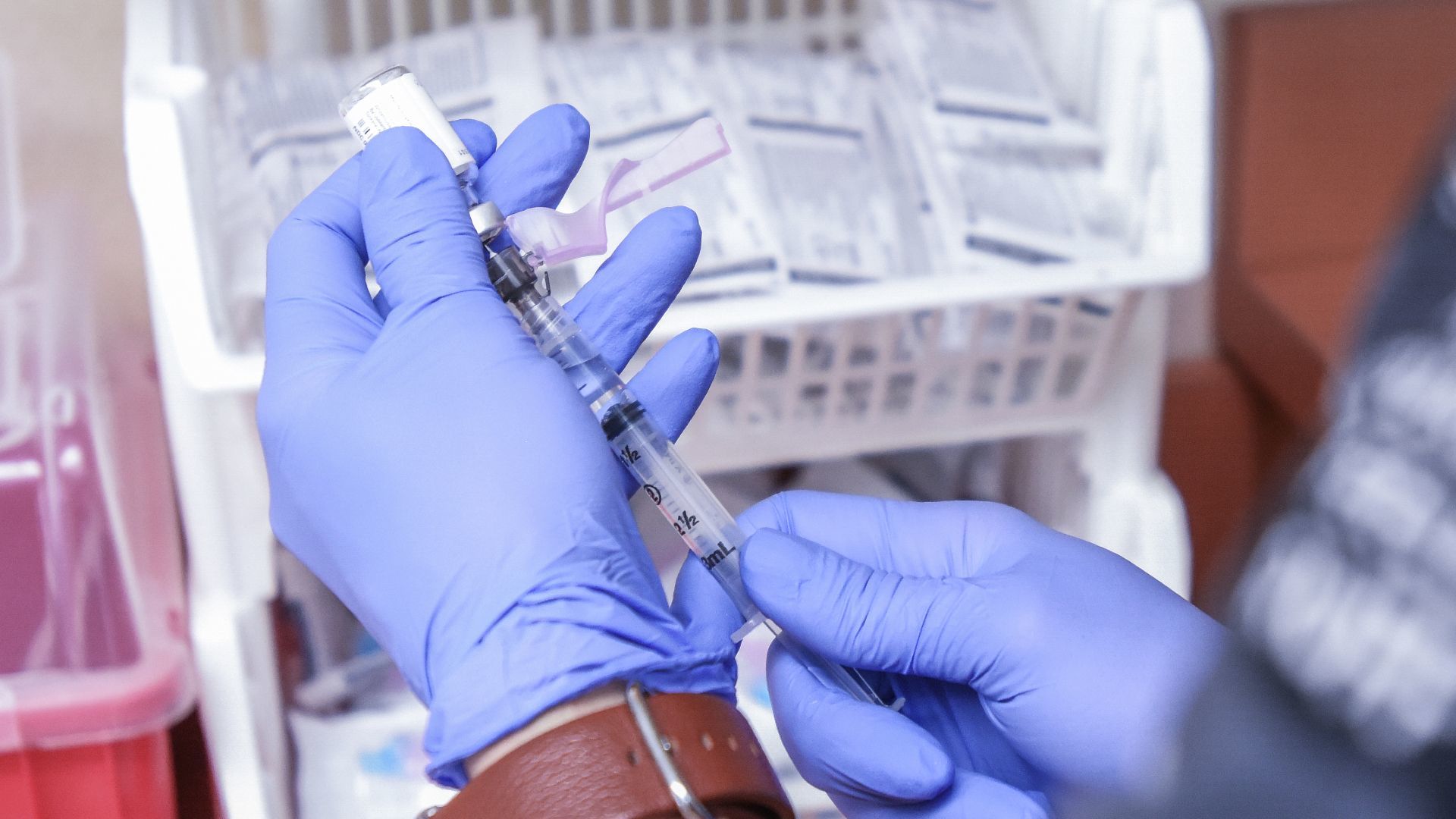
COVID VACCINE - Frequently Asked Questions, Updated July 1, 2015
Respiratory illness like COVID are particularly dangerous for infants, seniors, pregnant women, and those with underlying health conditions. When immunization rates drop, illnesses, hospitalizations, and deaths increase.
2025-2026 COVID Vaccine Formulas
The Vaccines and Related Biological Products Advisory Committee (VRBPAC) to the Federal Drug Administration’s (FDA) Center for Biologics Evaluation and Research (CBER) experts unanimously recommended that COVID-19 vaccines for the upcoming 2025-2026 respiratory season be composed using a monovalent vaccine.
A monovalent COVID-19 vaccine is a vaccine that targets only one specific variant of the virus. Monovalent vaccines are typically developed and used when a new, dominant variant of the virus emerges and the previous vaccines may not provide adequate protection against it. The goal is to provide targeted immunity against the dominant circulating variant. The 2025-2026 vaccine formula with target the current dominant strain, the JN.1 COVID-19 variant. It is important to get the updated formula because this variant is highly transmissible and can partially evade the immunity built up by vaccination and earlier infections with other coronavirus strains.
Vaccine Composition. None of the approved formulas from Pfizer, Moderna, or Novovax contain fetal cells. Some vaccines use historic human cell lines, originally developed in the 1960s, during the manufacturing process. These cell lines are not present in the final vaccine product. The Vatican has stated that it is morally acceptable to get vaccines that used fetal cell lines, especially when no other options are available and public health is at risk. Other Christian denominations, Judaism, and Islam have made similar statements.
Vaccine Options. Novavax’s Nuvaxovid vaccine is approved for adults 65 and older and for individuals ages 12 to 64 who have an underlying health condition that puts them at higher risk for serious illness from a coronavirus infection. It is a protein-based vaccine and seen as an alternative for those allergic to the mNRA vaccine. Both Moderna and Pfizer-BioTech’s COVID-19 mNRA vaccines are approved for adults 65 years and older and people 12 to 64 who have an underlying health condition that puts them at higher risk for serious illness from a coronavirus infection. Vaccination for “healthy” children, ages 6 months – 17 years is available under the shared clinical decision-making provision.
Vaccine Safety. Allergic reactions are very rare and similar to reactions that can happen with other vaccines, medications, or some foods. Mild systemic side effects include tiredness, body aches, and headaches, most of which last only 1-2 days and are treated with rest or over the counter medications.
The vaccines:
- do not alter your DNA
- do not cause infertility
- do not cause you to contract COVID
- are safe to co-administer with the flu vaccine
Who Should Be Vaccinated
Respiratory illness like COVID are particularly dangerous for infants, seniors, pregnant women, and those with underlying health conditions. When immunization rates drop, illnesses, hospitalizations, and deaths increase.
CDC Recommendations. The Center for Disease Control and Prevention (CDC) continues to recommend all eligible individuals get vaccinated against COVID. The CDC currently recommends that all individuals over 65 years of age and those 12 – 64 years that are medically vulnerable be vaccinated. It has removed the recommendation, as a scheduled immunization, for pregnant women and “healthy” children. However, the American College of Obstetrics and Gynecology continues to strongly recommend that pregnant women be vaccinated against COVID 19 and the American Academy of Pediatrics continues to recommend routine vaccination of children against COVID 19. In regard to healthy children, ages 6 months – 17 years, the vaccines will be available to that pediatric population under what is called shared clinical decision-making. When parents desire their children, 6 months through 17 years who are not moderately or severely immunocompromised, be vaccinated, they may be on an individual basis, informed by a decision process between the health care provider and the patient or parent/guardian.
Leading Medical Association Recommendations
Children. Childhood and adolescent immunizations are a valuable public health tool to prevent infection, hospitalization, and death. Maintaining high vaccination coverage is crucial for preventing outbreaks of vaccine-preventable diseases. Staying up to date on vaccines are the best way to protect children from becoming severely ill or having long-lasting health impacts due to COVID-19.
The American Academy of Pediatrics continues to emphasize the importance of vaccinating children against COVID, even though it's no longer a part of the routine immunization schedule and urges parents to request vaccination for children 6 months and older as it has been proven to be safe and effective. The American Academy of Family Physicians recommends that patients receive all recommended immunizations and does not support nonmedical immunization exemptions
Pregnant Women. The Infectious Diseases Society of America, American Academy of Family Physicians, American Academy of Pediatrics, American College of Physicians, and the American College of Obstetricians and Gynecologists, organizations that collectively represent a wide range of medical specialties and are committed to promoting evidence-based medicine and protecting public health, are strongly recommending COVID-19 vaccination for pregnant individuals.
These organizations emphasize that vaccination is safe and effective during pregnancy and is the best way for pregnant individuals to protect themselves from severe illness and potential harm from COVID-19 infection, including death. They also highlight that the vaccines have no impact on fertility and that infants born to vaccinated individuals are also protected.
Their recommendations are based on strong scientific evidence demonstrating the benefits of COVID-19 vaccination for both pregnant individuals and their infants. The organizations urge all pregnant individuals, as well as those recently pregnant, planning to become pregnant, or breastfeeding to get vaccinated.
Insurance Coverage for the 2025-2026 Vaccines
Medicare, Medicaid and private insurers will cover all or a portion of the cost for the new COVID vaccinations for those the CDC has deemed eligible. Coverage for those outside CDC parameters, may or may not be covered based on the individual policies of the insurance company.
The updated 2024-2025 COVID-19 vaccines are still recommended and available to people who haven’t already had one. However, the cost and availability for the rest of 2025 (when the new formula becomes available in fall 2025) will depend on your insurance status:
- Insured Individuals: Most people with private health insurance, Medicare, and Medicaid can still get the vaccine at no cost, as the Affordable Care Act requires insurers to cover ACIP-recommended vaccines without cost-sharing. However, it's wise to check with your insurance provider to ensure the vaccine is covered before receiving it, as getting it from an out-of-network provider might result in costs.
- Uninsured/Underinsured Individuals: The CDC's Bridge Access Program, which previously provided free vaccines to these groups, ended in August 2024. However, there might still be some free or low-cost options available through state or local health departments or through the CDC's Vaccines for Children (VFC) program for eligible children.
COVID in Vaccinated Individuals
Because no vaccine is 100% effective, some people will get COVID-19. These vaccine breakthrough cases are expected. However, vaccinated persons are likely to:
- Spend fewer sick days in bed
- Be less likely to have fever or chills
- May be less likely to spread the virus to others
Prior COVID Infections
If you’ve recently had COVID, it’s still important to stay up to date with your vaccines. According to the CDC, you can wait three months since your symptoms began or, for asymptomatic cases, since you first tested positive. There’s also some evidence to support waiting as long as six months after a COVID infection to receive an updated COVID vaccine. Waiting longer than three months is not recommended for high-risk groups, but it’s something people can discuss with their doctor.
Annual COVID Vaccination
Just like the flu vaccine, an annual COVID vaccine is recommended by healthcare experts for everyone, but especially important for those who are:
- 65 years and older
- Age 18+ who live in long-term care settings
- Those who have underlying medical conditions in consultation with their healthcare provider
- Age 18+ who work or live in high-risk settings
Long COVID
Long COVID or post-COVID-19 syndrome is an array of symptoms that present four to eight weeks after acute illness has passed. Long COVID can affect both adults and children. The condition is thought to affect as many as 30 percent of patients and can include a continuation of symptoms suffered during the acute phase — shortness of breath or fatigue, for example — along with new symptoms that occur after patients feel like they’ve recovered: chest discomfort, severe pain, dizziness, vomiting, brain fog. Even people who did not have any symptoms can experience long COVID, which can present as different types and combinations of health problems and can range in lengths of time. More Q & A about long COVID.
Vaccination may reduce the risk of long COVID in two ways. The first is by reducing the risk of becoming infected with COVID in the first place. A recent study also shows that fully vaccinated people who experience breakthrough infections are about 50% less likely to develop long COVID than people who are infected without having been vaccinated.
Antiviral COVID Drugs
Vaccination is the best line of defense against COVID-19. While antiviral drugs and other treatments are an important advancement, they are not 100% effective in reducing risk of hospitalization or death from COVID-19, and they are no substitute for getting vaccinated. Getting COVID-19 still causes serious health impacts for some people, especially those who are not vaccinated. Preventing serious infection by staying up to date on vaccinations and taking other precautions, like masking and distancing — particularly if your COVID-19 community level is high — are the best ways to protect your health.
However, taking an antiviral drug can lessen the severity and duration of COVID if taken early. Paxlovid, an oral antiviral pill that can be taken at home, is the go-to treatment for COVID-19. If you are at high risk for severe disease from COVID, and you take it within the first five days of experiencing symptoms, it will lower your risk of getting so sick that you need to be hospitalized. Paxlovid was granted full approval in May 2023 by the Food and Drug Administration (FDA) for the treatment of mild-to-moderate COVID in adults at high risk for severe disease, including hospitalization and death. The drug had an 89% reduction in the risk of hospitalization and death in unvaccinated people in the clinical trial.







